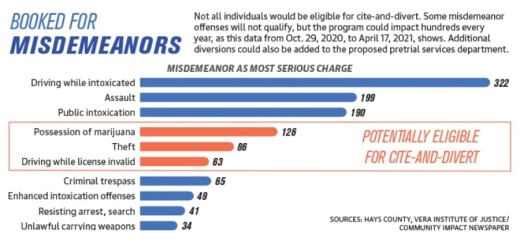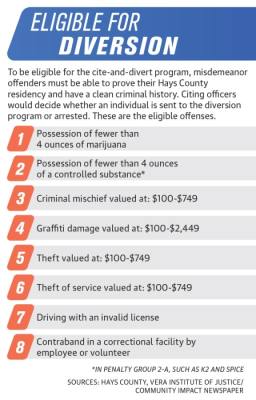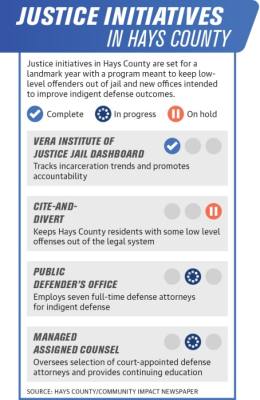A proposed pretrial services department would, among its functions, manage the county’s long-delayed cite-and-divert program, which is designed to help certain low-level offenders maintain a clean record.••Additionally, a managed assigned counsel system, or MAC, and a public defender office, or PDO, are being developed to streamline the appointment of attorneys to defendants who cannot afford their own lawyers, and to improve their legal outcomes with dedicated resources and legal investigators.
To fund the PDO and MAC, the county would be reliant upon a multimillion-dollar grant from the Texas Indigent Defense Commission, an entity that helps improve public defense programs throughout the state, to cover half of the cost of the first four years.
However, the county will not find out if it is awarded the grant until later this year, and while proponents continue advocating for a swift execution of these programs, other stakeholders are urging a more measured approach.
Among them is Todd Dudley, a member of the Hays County Defense Bar, who said cite-and-divert participants require legal counsel, and multiple attorneys are needed in order to avoid ethical issues.
On April 28, he voted against the PDO and MAC grant application during a Criminal Justice Coordinating Commission meeting.
“The most important thing, as a defense lawyer, is the person that’s arrested is accorded their rights,” Dudley said. “I think that if we rush, and then we pass over some things, we really haven’t accomplished a whole lot.”
Cite-and-divert program comes into focus
First proposed in 2019, Hays County’s cite-and-divert program would provide law enforcement officers with an additional option when dealing with low-level offenses, including possession of fewer than 4 ounces of marijuana, theft crimes valued between $100 and $749, and driving with an invalid license.••It would also help some county residents maintain a clean criminal record.
Officers would issue a citation to eligible people, but instead of turning themselves in to jail at a future date, which is how cite and release functions, impacted individuals would meet with the pretrial services department and would be asked to pay restitution and complete a combination of educational courses and community service in lieu of going to trial.••Among those seeking to implement cite-and-divert as soon as possible is local justice reform organization Mano Amiga, which has repeatedly expressed its frustration that the program has been in limbo since last September.
“I respect Mano Amiga, and I’m glad they’re involved. I like them holding everybody’s feet to the fire, and I respect that and appreciate it,” Dudley said. “Things take time to get right. I mean, you’ve got a lot of players involved.”
In a joint news release issued with Hays County Sheriff Gary Cutler last July, Hays County District Attorney Wes Mau announced cite-and-divert’s planned start date of Sept. 1, 2020, but as yet the county has still not enacted the program.
Precinct 3 Commissioner Lon Shell has also expressed some frustration with the delay but said valid concerns had been raised about the program by local defense attorneys.
Shell said he and Mau’s office were prepared to enact the program with the county’s police chiefs and hold training sessions for officers regarding proper procedures. However, stakeholders have continued to advocate for a more calculated path toward enactment.
Mano Amiga Policy Director Eric Martinez said he believed the program and public would be better served by getting it off the ground sooner rather than later.
“You just have to get something started,” Martinez said. “Once a program becomes operational, that’s when you really find out all of the quirks that need to be fixed.”
For Jake Rankin, a 25-year-old San Marcos resident who was arrested on a misdemeanor possession of marijuana charge in December 2018 and October 2020, the legal process of his first case lasted roughly a year and cost him about $2,000. He said at that time he was making roughly $11 per hour while supporting his mother.
“I’m not a criminal,” Rankin said. “I’m not out here causing any harm to the community or anything.”
With the 2018 arrest on his record, Rankin’s 2020 arrest would have been ineligible for cite-and-divert if the program had been launched as previously planned for September.
Under the proposed qualifications, Rankin’s first case may have been eligible if the program had existed during that time, and he could have saved hundreds of dollars and avoided an arrest.
The misdemeanor charge and arrest would also have been removed from his record, amending a situation that would normally require additional time and money for expungement.
People rerouted through the new diversion program would also avoid mugshots, which Martinez said have a permanent impact on defendants.
“For people who go through the booking process, they’re never escaping that booking photo,” Martinez said.
Cite-and-divert limitations
Mau helped design the cite-and-divert program and said it has its limitations. For instance, people with criminal records and those who cannot demonstrate residency in Hays County would not be eligible, and officers would use cite-and-divert at their discretion.
“We’re not going to be diverting people from the justice system that we would otherwise be looking to get jail sentences, probations or other kinds of convictions,” Mau said.
The district attorney also said he would not expect some crimes to be diverted even though they may technically be eligible for cite-and-divert, such as an arrest for 4 ounces of marijuana.
People who have been through the program once would also not be eligible for a second time through, according to Mau.
The program would remove certain steps in the legal process, but Mau said outcomes would be very similar to the current system of in-court diversions his office can perform, which happens after people have been booked into jail and in a court.
“What the cite-and-divert program was intended to do was to kind of shortcut the jail magistrate court process and just go straight to the diversionary program, get them through it and then we don’t have to bother with filing a charge and dismissing a charge later,” he said.
Mau said cite-and-divert’s implementation is tied to the formation of the pretrial services department and the appointment of a director, which he said he did not expect would happen before July 1.
Two new proposed pretrial programs
A proposed pretrial services department will likely be pursued regardless of whether the TIDC awards grant funding, according to Shell.
“I believe a pretrial office could be a good home for cite-and-divert; however, a pretrial program could be created for other reasons as well,” Shell said.
Less certain is the future of the PDO and MAC if grant funding falls through. Both programs would be run by Neighborhood Defender Service, a company operating PDOs in Detroit and New York City.
The MAC would replace the bulk of the current assigned counsel system—which judges use to appoint local defense lawyers to indigent defense cases on a rotating basis—and would appoint indigent defense attorneys in as many as 70% of felony cases and 82% of misdemeanor cases, according to NDS.
NDS proposed it would handle 414 felony and 717 misdemeanor cases per year for Hays County, or 30% and 18%, respectively.
A total of 21 employees, including three investigators and eight lawyers—seven to the PDO and one to the MAC—would be employed in the first year, and the total first year cost would be $2,256,582.
The TIDC grant, which would cover half of the program’s cost over the first four years, will be structured to cover 80% of the first year’s cost with 20% reductions every year after, or in a similar manner.
Mau said the Commissioners Court and the Hays County Criminal Justice Coordinating Commission will try to create a consensus among defense attorneys and judges for how these programs function.
He added the planned PDO may focus on juvenile court cases or cases with a mental health aspect because those are areas that require expertise beyond the general criminal law practice.
The NDS did not respond to multiple interview requests, but its proposal claims it would reduce pretrial detention rates, improve case outcomes and generate significant cost savings.
Training, supervision and mentoring services for PDO attorneys and local defense attorneys participating in the MAC program would also be provided by the NDS.
Dudley said that while he is a fan of some aspects of the MAC program, he believes it needs further consideration.
“It just feels like it’s getting rushed through, and we’re really not taking a look at it,” he said.
Shell said he intends to move the programs forward. For now, he said he is willing to accelerate steps toward the pretrial services department’s creation, and hopefully pieces will fall into place as events proceed and those who are hesitant will eventually endorse the process.
“Some may say ‘Maybe I need a little more time,’” Shell said. “I’ll just say, respectfully, ‘That’s fine, but we’re going to move forward with the application.’”








